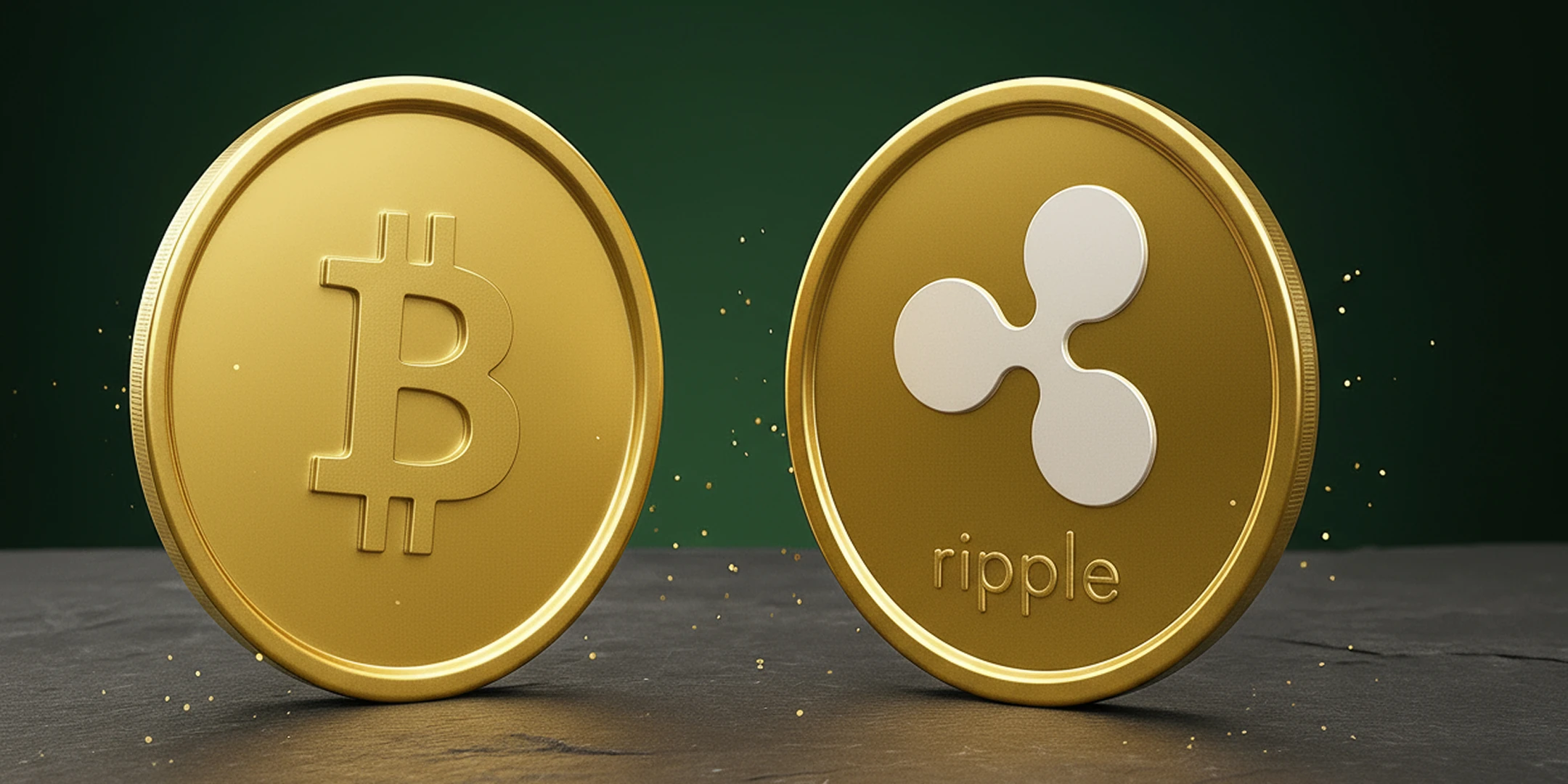In the world of cryptocurrencies, Bitcoin and Ripple are considered prominent representatives, but they take different approaches. While Bitcoin has been considered a pioneer of digital currencies for over a decade, Ripple (XRP) was developed to enable fast and inexpensive cross-border payments. Many investors are therefore asking themselves: What is the difference between Bitcoin and Ripple? And is Ripple actually better than Bitcoin for investments or long-term value storage?
This article provides a well-founded overview of Bitcoin and Ripple, explains their consensus mechanisms, decentralization, transaction speed, and application options. In the end, it becomes clear why Bitcoin is the better choice for investors who rely on stability and long-term value.
What is Bitcoin?
Bitcoin (BTC) was created in 2009 by the anonymous person or group “Satoshi Nakamoto.” It is the first cryptocurrency based on a blockchain — a decentralized, transparent registry that securely documents transactions and makes manipulation almost impossible.
Consensus mechanism
Bitcoin uses the proof-of-work (PoW) mechanism. Miners solve complex math problems to validate new blocks. This process secures the network, makes it decentralized and prevents fraud. At the same time, PoW is energy-intensive, but ensures the high level of security that characterizes Bitcoin.
Mining and decentralization
Bitcoin is generated through mining, which simultaneously validates transactions. Thousands of nodes worldwide secure the network, meaning that no central authority has control. This strong decentralization makes Bitcoin extremely resistant to hacker attacks or regulatory intervention.
Bitcoin as a store of value
Bitcoin is considered digital gold: The maximum amount of 21 million coins creates scarcity, and increasing acceptance among companies and institutional investors reinforces the value. Despite short-term volatility, many investors regard Bitcoin as a long-term hedge against inflation and economic uncertainty.
Transaction speed and fees
Bitcoin's average transaction speed is 3-7 transactions per second (TPS), and transaction fees can rise when network usage is high. Despite these limitations, Bitcoin offers stability, security and a clear status as the first and best-known cryptocurrency.
What is Ripple?
Ripple (XRP) is a digital currency and at the same time a payment network that was developed specifically for fast and cost-effective cross-border transactions. In contrast to Bitcoin, which primarily serves as a store of value, Ripple focuses on efficiently connecting financial institutions and banks.
XRP Ledger and RippleNet
Ripple's transactions run on the XRP Ledger (XRPL), a proprietary blockchain that is specifically optimized for speed and low costs. RippleNet is the payment network that gives banks and financial service providers access to XRP and fast transactions. As a result, money transfers can be carried out worldwide within seconds, while Bitcoin transactions take significantly longer.
Consensus mechanism and validators
In contrast to Bitcoin, Ripple does not use mining and proof of work (PoW). Ripple uses its own consensus mechanism, in which validators check and confirm transactions. These validators are distributed across a network of trustworthy instances, but significantly smaller and more centralized than Bitcoin. As a result, Ripple can work extremely fast, but is less decentralized and therefore more susceptible to central influences.
Special features of Ripple
- Quick transactions: XRP can process thousands of transactions per second.
- Low transaction fees: Transfers only cost a fraction of what is usual with Bitcoin.
- Banks and institutions: Ripple is being tested and used by many financial institutions, which underlines its practical applicability.
Decentralization vs. centralization
A key difference to Bitcoin is centralization: A small circle of validators controls a large part of the network, and a significant portion of the XRP amount is held by Ripple Labs. While this structure enables speed and efficiency, it reduces resilience to manipulation or regulatory intervention.
Ripple vs. Bitcoin — Direct Comparison
When investors choose between Ripple (XRP) and Bitcoin (BTC), several factors play a decisive role: consensus mechanism, decentralization, transaction speed, fees, market performance, and application options.
Consensus mechanism
Bitcoin uses Proof of Work (PoW): Miners solve complex math problems to validate new blocks. This process ensures maximum security and decentralization, but is energy-intensive and limits speed.
Ripple, on the other hand, uses its own consensus mechanism, where validators verify transactions. This approach enables very quick confirmations, but reduces decentralization as a small group of validators control the majority of the network.
Decentralization and centralization
Bitcoin is highly decentralized, with thousands of nodes worldwide securing the network. Ripple is more centralized: A large part of the XRP volume is held by Ripple Labs, and only a limited number of validators decide on transaction validation. For investors, this means that Bitcoin offers more security in the long term, while Ripple is optimized for fast, controlled transactions.
Transaction speed and fees
Ripple scores points with extremely fast transactions: Payments are completed in just a few seconds, while Bitcoin processes an average of 3—7 transactions per second. Ripple's transaction fees are also very low, making it ideal for cross-border payments. Bitcoin, on the other hand, is slower and more expensive, but offers stability and security.
Market performance and forecasts
If you compare XRP vs. Bitcoin chart or market cap, it becomes clear that Ripple can have high volatility and rapid price movements in the short term. Bitcoin is becoming more stable, with increasing acceptance among institutional investors and long-term forecasts that suggest continuous growth in value.
Scope of application
- Bitcoin: Long-term store of value, digital protection, investment
- Ripple: Payment network for banks, fast transfers
Investing in Bitcoin and Ripple
Anyone who wants to invest in cryptocurrencies is often faced with the question: buy XRP or Bitcoin? Both assets offer opportunities but pursue different strategies and risk profiles.
Bitcoin as a long-term investment
Bitcoin is considered digital gold. With a maximum amount of 21 million coins, BTC is scarce and protects against inflation in the long term. Despite short-term price volatility, many investors see Bitcoin as a secure store of value that gains stability over the years. Institutional investors are increasingly turning to Bitcoin, and products such as Bitcoin ETFs make it easier for private investors to get started.
Ripple for fast transactions
Ripple was designed to enable fast, low-cost cross-border payments. XRP Ledger (XRPL) and RippleNet ensure that transactions are completed within seconds. Ripple is therefore extremely practical for banks and financial service providers. Investors should note, however, that centralization at Ripple increases risk and that XRP primarily serves as a useful token for payments, not as a long-term store of value.
Risk profile and market forecasts
- Bitcoin: Stable, decentralized, growing over the long term; forecasts see continuous growth in value.
- Ripple: High speed, low fees, but centralized and vulnerable to regulatory influences; price highly volatile.
Anyone looking for short-term profits or using XRP for quick payments could consider Ripple. On the other hand, anyone who focuses on long-term value protection and stability should prefer Bitcoin.
conclusion
Bitcoin and Ripple are taking different approaches in the world of cryptocurrencies. Bitcoin impresses with its decentralization, security, scarcity and status as a digital store of value. These characteristics make BTC a stable, long-term investment for investors who value stability and inflation protection.
Ripple (XRP), on the other hand, scores points with extreme speed, low transaction fees and efficient payment processing via banks and financial institutions. The XRP Ledger (XRPL) and RippleNet enable cross-border payments in seconds. However, this efficiency comes at the expense of decentralization: A small circle of validators control the network, and a large part of the XRP volume is held by Ripple Labs. This makes Ripple riskier for long-term investors.
For investors who prioritize long-term value, security, and stability, Bitcoin is clearly the better choice.
FAQs — Frequently asked questions
1. What is the difference between Bitcoin and Ripple?
Bitcoin is a decentralized cryptocurrency and store of value, while Ripple is a fast payment network that uses centralized validators. Bitcoin is suitable for long-term investments.
2. Is Ripple better than Bitcoin?
That depends on the intended use. Ripple is convenient for fast, cheap transactions; Bitcoin remains superior for long-term investment, security and decentralization.
3. Does Ripple still have a future?
Ripple will continue to be interesting for banks and financial service providers. However, centralization remains a risk, which is why long-term investors prefer Bitcoin.
This article is for informational purposes only and does not constitute an offer or investment advice. No guarantee is given for the accuracy or completeness of the information. Marketing communication, FIOR Digital GmbH.




